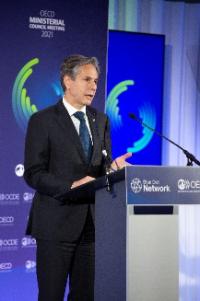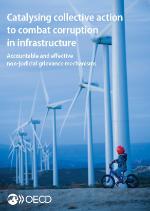Corporate governance and corporate finance
Infrastructure Anti-Corruption Toolbox – I ACT
|
Strengthening trust in infrastructure development
Quality infrastructure investment is key to addressing global challenges stemming from Covid-19, the war in Ukraine, the current energy crisis, climate change and achieving the Sustainable Development Goals. However, the infrastructure sector is particularly vulnerable to corruption, with 30 to 50 percent of national infrastructure spending being lost due to corruption inefficiencies.
The Infrastructure Anti-Corruption Toolbox (I ACT) is a holistic multi-stakeholder approach to empower actors across the infrastructure value chain to prevent, detect and report corruption and support a level playing field for business.
Launched at the 2021 OECD Ministerial Council Meeting, by the U.S. Secretary of State the Hon. Antony Blinken, I ACT aims to assist stakeholders to meet international anti-corruption and integrity standards including the OECD Convention on Combating Bribery of Foreign Public Officials in International Business Transactions, the OECD Guidelines for Multinational Enterprises and related instruments. I ACT takes forward B20 recommendations and further assists stakeholders to meet international best practices, such as the Blue Dot Network minimum requirements for anti-corruption.
|
Antony Blinken, U.S. Secretary of State at the launch of the Infrastructure Anti-Corruption Toolbox. 2021 |
I ACT s a flexible platform that allows for developing and creating a wide range of tools and activities to prevent and detect corruption in infrastructure. The toolbox focuses on four areas: knowledge creation, capacity building, public-private cooperation and enhancing accountability.
COLLECTIVE ACTIONAt the centre of the toolbox is the I ACT Community, composed of C-suite leaders, experts from civil society and government officials that inform, catalyse and implement the I ACT tools. Members of the community have expressed an interest and need for a Collective Action to promote trust and integrity in the infrastructure sector. |
CAPACITY BUILDINGI ACT provides stakeholders from different regions and sub-sectors with training and learning to improve compliance systems, build trust and integrity in organisations, and level the playing field across the infrastructure value chain. Tools, such as Compliance without Borders will strengthen compliance and anti-corruption frameworks in state-owned enterprises. |
KNOWLEDGE CREATIONI ACT aims to better understand and address corruption in infrastructure projects in the current socio-political and economic context. Drawing upon a rich evidence base, OECD Instruments and best practices, and stakeholders’ experiences the project provides practical information to improve corruption prevention, detection and reporting strategies across a project value chain. |
ENHANCE ACCOUNTABILITYHolding actors accountable and providing avenues for worker and citizen participation is key to quality infrastructure development. The High-Level Reporting Mechanisms (HLRM) addresses systemic challenges embedded in public contract allocation systems. I ACT aims to enhance the broader adoption of accountability mechanisms in infrastructure development. |
Meetings
|
|
|
Engage with I ACT
Private sector and civil society organisations interested in engaging with I ACT are invited to contact:
|
Project Funding
The project is supported and financed by the Bureau of International Narcotics and Law Enforcement Affairs, U.S. Department of State.
 |
Links
2021 OECD Anti-Bribery Recommendation
Tackling Bribe Solicitation Using the High-Level Reporting Mechanism for Preventing Bribery
The Basel Institute on Governance
B20 Italy 2021 - Integrity & Compliance Taskforce Policy Paper
B20 Saudi 2020 - Integrity & Compliance Taskforce Policy Paper
B20 Argentina 2018 - Integrity & Compliance Taskforce Policy Paper
US Strategy on Countering Corruption
Related Documents

